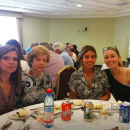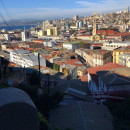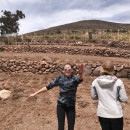I found a second family and second home in Valparaíso Past Review
By Olivia Arback (University of Colorado - Boulder) - abroad from 08/28/2018 to 12/10/2018 with
SIT Study Abroad: Chile - Cultural Identity, Social Justice, and Community Development
I gained confidence in myself. The confidence that I can move to another country alone with a huge language barrier and come out with not only American friends I will have for a lifetime, but a Chilean family who I love with my whole heart. I learned a lot about how I deal with stress and how I deal with challenges that come with leaving your country's comfort zone, which will 100% help me in the future. I believe that the challenges I faced were worthwhile and I would go back and do the program in a heartbeat.
Review Photos




Personal Information
| How much international exposure did you have prior to this program? | 6 months+ |
Review Your Program
|
* Overall educational experience
Academic rigor, intensity, resources, etc. |
I went into the program expecting that academics would be relatively easy, since my friends who went abroad before me said they barely did homework and got straight As. I was surprised about the intensity of the academic side of this program. The school part of the program is only about 2 months so classes are long (from 9am-5pm) and intense. Homework is essays and 2 oral presentations for Spanish classes and for lectures, the only homework is reading and one group oral exam at the end. You get placed in a Spanish class (I-III) and lectures are all in Spanish. I was placed in Spanish I and I found the lectures were a lot more difficult for me, but I did learn a lot in the lecture classes even though I had to put in more effort to understand. The last month of the program you get the choice of doing an internship or an independent research study (ISP). I did the ISP and I highly recommend it because you have more freedom on the subject and if you want to explore Chile, you can travel a bit. You do have to write 25 page research paper in Spanish, but as long as you have good time management skills you will be fine. I was (and still am) not fluent in Spanish but I ended up writing 41 pages in Spanish and had an advisor that helped point me in the right direction. |
|
* Host Country Program Administration
On-site administration of your program |
The administration in country were extremely supportive of us and would have check-ins throughout the semester to check up on our mental health, since going abroad in a country that doesn't speak English can be stressful. They also are extremely responsive about health needs and if you are having problems in your host family. |
|
* Housing:
How satisfied were you with your living arrangements? |
I was extremely satisfied with my living arrangements. It is required to do a home stay, which I was so nervous about. I personally believe that the home stay was the best part of the program for me. They try to match you as best as they could with a family and I was so lucky that my family and I shared the same views in life and were very supportive and patient with my Spanish. I would say with host family, spend as much time as you can with your family and take every opportunity they give you to spend time with them. My Spanish improved from just spending time with my host mom and my host sister. SIT will have you in a house near other students so you don't feel like the only gring@ on the block. |
| * Food: |
Chileans do not season their food beyond mayo, salt, olive oil, and lemon. I am a huge chef and I love using seasoning so this was difficult at first but it taught me to love the natural flavor or foods! I am a vegetarian and found it very easy to eat. My host mom is an angel and learned how to make high protein meals, like lentils and even veggie burgers, so I can get the food I need. I did have problems in the south and north when we went on excursions because they eat more meat in those regions, but I just ate eggs everyday and was fine. Be ready to eat a lot of really yummy bread. Chileans eat a large, hot lunch and a small dinner (or once) that consists of cold cuts, bread, avocado, and tea. My host family would sometimes give me a hot American dinner sometimes to get used to eating so late and a little, which we are not used to in America. I recommend diving in and joining in on once. |
|
* Social & Cultural Integration:
How integrated did you feel with the local culture? |
I felt extremely integrated with the local culture. I was extremely lucky because my host family taught me a lot about the culture and my cerro did as well. I was lucky that my host sister was a year older than me and the other kids of the host parents on my cerro were also my age, so we would go out at night together or just go to the beach together. By the end I was strolling the streets like a Chilean, eating like a Chilean, and using Chilenismos like a Chilean. |
|
* Health Care:
How well were health issues addressed during the program? |
I thought that health issues were addressed very well. I had inflamed cartilage in my rib cage while I was in Chile and I was scheduled a X-ray and doctors appointment three days after alerting someone. |
| * Safety: |
I personally would walk back to my cerro alone a lot and walk the streets by myself alone too. Granted, I do not look as much like a gringa than some of my friends. Many people in the program did get pick pocketed and one girl got her backpack stolen off her back. I would recommend never walking alone at night or just taking an uber at night (I found uber to be the most reliable), don't take your phone out or put in in your front pockets or waist band, get a backpack with clips on the waist and on your chest, and if things seems sketchy speak in Spanish. Chile and Valparaíso are like any other city abroad, be smart and remember not to get too comfortable since you will be targeting more by petty theft because you are American. |
| If you could do it all over again would you choose the same program? |
Yes
This program opened my eyes to what I would like to do in life (socio-environmental justice) and showed me that I can accomplish anything I put my mind to. It didn't hurt that Valparaíso is one of the most unique cities I have ever been to. |
Finances
|
* Money: How easily were you able to live on a student's budget?
(1 = not very easy/$200+ on food & personal expenses/week, 2.5 = $100/week, 5 = very easily/minimal cost) |
It honestly depends. I ate all my meals with my host family, so I wasn't going out to eat a lot. If I did it was relatively cheap places, I never went out to super fancy restaurants. The majority of my spending came from trips (i.e Air bnbs, bus fare, food while in a different city), buying souvenirs, and bus or train fare. The program does give you some money for transportation costs and they give you money for printing your ISP/Internship essay which are pricey. |
| Not including program expenses, about how much money did you spend on food and other expenses each week? | ~$70 (USD) |
| Do you have any general money-saving tips for future study abroad participants? | Try not to eat out, Chile is not that much cheaper than the US, so make sure you know the conversion! Save a certain amount of money for souvenirs and then don't spend more than that. It is very tempting to get a $30 artisanal good, but make sure it is in your budget. You will save the most by not eating out. |
Language
| * Did your program have a foreign language component? | Yes |
|
How much did the program encourage you to use the language?
0 = No encouragement, 5 = frequent encouragement to use the language |
You will be speaking Spanish in all your classes and lectures and the program encourages you to speak Spanish while you are in Casa SIT and the University. You will speak Spanish in your homestays, some parents and siblings can speak english, but they have been encouraged not to by the program. On the northern and southern excursions you will be speaking Spanish 24/7. I honestly was speaking Spanish the majority of the time that I was in Chile, which was very difficult in the beginning of the program, but got easier near the end. |
| How would you rate your language skills at the beginning of the program? | Beginner |
| How would you rate your language skills at the end of the program? | Advanced |
| What was the highest level language course you had completed prior to departure? | SPAN2120 |
| How many hours per day did you use the language? | 10+ |
| Do you have any tips/advice on the best ways to practice the language for future study abroad participants? | The best way to practice the language is to stop worrying about being wrong all the time. If you mess up a pronunciation or a verb ending, people will help you! I was very hard on myself about being wrong, to the point where I did not talk much, but once I decided that people will correct me when I'm wrong and be understanding because I was trying, I saw my Spanish exponentially get better. I also learned the most from just listening and talking to my host mom and sister during once or after class. For before entering the country I would say download Duolingo, this is what I use now to keep up with my Spanish. It is free and very easy to use. Also watch telenovelas, they're pretty easy to follow, or listen to Spanish podcasts where they speak slow. |
Other Program Information
|
* Where did you live?
Select all that apply |
|
|
* Who did you live with?
Select all that apply |
|
|
* Who did you take classes with?
Select all that apply |
|
| About how many local friends did you make that you will likely keep in touch with? |
A Look Back
| * What did you like most about the program? |
|
| * What could be improved? |
|
| * What do you know now that you wish you knew before going on this program? | I wish that I knew how intense the Spanish would be. I knew that we would be speaking Spanish, but I did not understand the magnitude of it and I wished that I had practiced my Spanish more before I left. |








